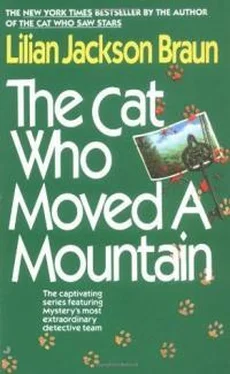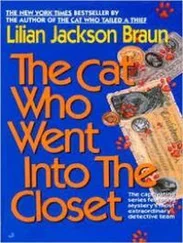Лилиан Браун - The Cat Who Moved A Montain
Здесь есть возможность читать онлайн «Лилиан Браун - The Cat Who Moved A Montain» весь текст электронной книги совершенно бесплатно (целиком полную версию без сокращений). В некоторых случаях можно слушать аудио, скачать через торрент в формате fb2 и присутствует краткое содержание. Год выпуска: 2011, Жанр: Детектив, на английском языке. Описание произведения, (предисловие) а так же отзывы посетителей доступны на портале библиотеки ЛибКат.
- Название:The Cat Who Moved A Montain
- Автор:
- Жанр:
- Год:2011
- ISBN:нет данных
- Рейтинг книги:3 / 5. Голосов: 1
-
Избранное:Добавить в избранное
- Отзывы:
-
Ваша оценка:
- 60
- 1
- 2
- 3
- 4
- 5
The Cat Who Moved A Montain: краткое содержание, описание и аннотация
Предлагаем к чтению аннотацию, описание, краткое содержание или предисловие (зависит от того, что написал сам автор книги «The Cat Who Moved A Montain»). Если вы не нашли необходимую информацию о книге — напишите в комментариях, мы постараемся отыскать её.
into a mystery involving the
murder of J. J. Hawkinfield, the
developer who was pushed off
a mountain years before after
announcing his plans to develop the region.
The Cat Who Moved A Montain — читать онлайн бесплатно полную книгу (весь текст) целиком
Ниже представлен текст книги, разбитый по страницам. Система сохранения места последней прочитанной страницы, позволяет с удобством читать онлайн бесплатно книгу «The Cat Who Moved A Montain», без необходимости каждый раз заново искать на чём Вы остановились. Поставьте закладку, и сможете в любой момент перейти на страницу, на которой закончили чтение.
Интервал:
Закладка:
She regarded him with indecision, as if wondering whether to reach for a shotgun.
"You're on the wrong mountain!" she snapped.
CHAPTER 3
The mountain woman with hollow cheeks and sunken eyes stood with her hands on her hips and glared at Qwil-leran. Assumingfrom his astonished expressionthat he had not heard the first time, she screamed, "You're on the wrong mountain!" Then, half turning, she shouted something over her shoulder, after which she pushed past him, grumbling, "Follow me." She was wearing grubby jogging shoes and a long, full skirt, and with skirt and long hair flying she leaped off the porch, ignoring the steps. Before Qwilleran had sense enough to return to his own car, she had started the spluttering motor of the pickup.
The ordeal of the last two hours had been stupefying, but now he gathered his wits and followed the other vehicle gratefully as it led the way back down the narrow road to a fork, where it turned onto an upbound trail. The lead vehicle was a modified pickup with the chassis devated high above the wheels to cope with rough terrain like this, but Qwilleran's sedan bounced in and out of ruts, causing non-stop complaints from the backseat.
"Quiet!" he scolded.
"Yow!" Koko scolded in eloquent rebuttal.
The route meandered left and right and dipped in and out of gullies. There was one hopeful sign, however; Spudsboro was again visible in the valley, meaning they were back on the inside of the mountain. When they finally reached a paved road, the woman stopped her truck and leaned from the driver's seat, shouting something.
Jumping out of his car, Qwilleran hurried in her direction, saying, "How can I thank you, ma'am? May I"
"Just get out of my way," she growled, revving the motor and making a reckless U-turn.
"Which way is up?" he called to her as she drove away. At least he was now on solid blacktop, and if "up" proved to be "down," he had only to turn around and drive in the opposite direction, assuming there was gas enough in the tank. This was the route he should have discovered two hours ago. There were hairpin turns, but the road's edge was marked by white lines and protected by guardrails, and double yellow lines separated the upbound and downbound lanes. The speed limit was posted, as well as warnings about dense fog, fallen rocks, and icy bridges. A creek, rushing alongside the road, occasionally disappeared and emerged somewhere else. At one point Qwilleran met a sheriffs car coming downhill, and he returned the stare of the officer behind the wheel.
Around the next bend he came upon a handsome house in a carefully landscaped clearing, its many levels ingeniously designed for a hillside. Large glass areas overlooked the valley. The russet stain on the board-and-batten exterior looked appropriately woodsy but failed to conceal that this was an architect-designed residence with a three-car garage and a swimming pool. In slowing down to observe the details, Qwilleran was able to read a rustic signboard: SEVEN LEVELS . . . THE LESSMORES.
Farther up the mountain another impressive house was designed with cedar boards applied diagonally to form a herringbone pattern. A satellite dish faced a wide swath cut in the forest. The rustic signboard read: THE RIGHT SLANT . . . DEL AND ARDIS WILBANK.
Hawk's Nest Drive climbed higher and higher, hugging roadside cliffs crowned with trees that were losing their footing and leaning precariously over the pavement. With every turn Koko yowled vociferously and Yum Yum made threatening intestinal noises as their bodies swerved left, right, left, right . . .
Suddenly Tiptop burst into view, brooding above them on a rocky knoll. The clamor in the backseat stopped abruptly, and Qwilleran stared through the windshield in disbelief. He had expected it to be more cheerful, more hospitable. Instead, Tiptop was a dark, glowering, uninviting building in a gray-green stain, the upper floor sided in gray-green fishscale clapboard. The main floor windows were shaded by a gray-green wrap-around veranda, while second floor windows and attic dormers were darkened by deeply overhanging roofs.
"Great!" Qwilleran muttered as he parked in a black-topped area large enough for ten cars. "Don't go away," he said to his caged passengers. "I'll be right back." It was his custom to check for hazards and feline escape routes before introducing the Siamese to a new environment. Slowly, noting every dismal detail, he walked toward a gray stone arch inset with a mosaic of darker pebbles spelling out TIPTOP INN1903. From there a broad flight of stone stepshe counted eighteenled up to the inn, and seven wooden steps painted battleship gray led up to the veranda.
Unlocking one of the French doors that marked the main entrance, Qwilleran walked into a dark foyera wide central hall running the length of the building and ending in more French doors at the rear. Their glass panes did little to lighten the foyer, and he switched on lights three chandeliers and six wall sconces. He flipped switches in the surrounding rooms alsoa cavernous living room, a dining room that seated twelve, a hotel-size kitchen thankful that electricity was included in the rent.
Next he opened a window to freshen the deadness of the atmosphere and discovered there were no screens to keep the Siamese from jumping out. This was another mark against the place. They liked to sit on a windowsill sniffing the breeze, yet not a single window was screened. In each room he lowered the sash a few inches at the top for ventilation. This done, he brought the cats and their baggage into the kitchen, fed them a can of salmon hurriedly, and pointed out the location of their waterdish and commode in the pantry.
For himself he brought in the computerized coffeemaker without which he never left home. Although he had been obliged to swear off alcohol and had been convinced by an attractive woman M.D. in Pickax to give up smoking, he still insisted upon his coffee; he liked it strong and he liked it often. Carrying a cupful of the brew and with apologies to the Siamese for leaving them in the kitchen, he now wandered through the house with a critical eye. During his days as a roving news correspondent, checking in and out of hotels, his environment had meant little, but his changing circumstances in recent years had given him an awareness of pleasant living quarters.
The interior of Tiptop, though obviously redecorated not too long ago, was depressingly gray: gray plush carpet, gray damask draperies, wallcoverings predominantly gray. Certain items of massive furniture, circa 1903, were appropriate in sixty-foot rooms with ten-foot ceilings, but they were grotesque in design. More attractive were the sofas, chairs, and tables added by recent owners, and yet the rooms looked bleak, as if deliberately stripped of all small objects. There were sculpture pedestals without sculpture, plant stands without plants, bookcases without books, vitrines without curios, china cabinets without china, and lamp tables without lamps. Pictures had been removed, leaving hooks and discolored rectangles on the walls.
And for this, Qwilleran thought, I'm paying $1,000 a week!
Only one picture remained, a painting of mountains, hung in the foyer over a chest on which were a telephone and a phone directory. He looked up the numbers of the Lessmore office and residence and left the identical message in both places: "Tiptop has been burglarized!" Hurried visits to the six bedrooms upstairs and the recreation room on the lower level confirmed the fact. Even the three fireplaces were stripped.
Читать дальшеИнтервал:
Закладка:
Похожие книги на «The Cat Who Moved A Montain»
Представляем Вашему вниманию похожие книги на «The Cat Who Moved A Montain» списком для выбора. Мы отобрали схожую по названию и смыслу литературу в надежде предоставить читателям больше вариантов отыскать новые, интересные, ещё непрочитанные произведения.
Обсуждение, отзывы о книге «The Cat Who Moved A Montain» и просто собственные мнения читателей. Оставьте ваши комментарии, напишите, что Вы думаете о произведении, его смысле или главных героях. Укажите что конкретно понравилось, а что нет, и почему Вы так считаете.












